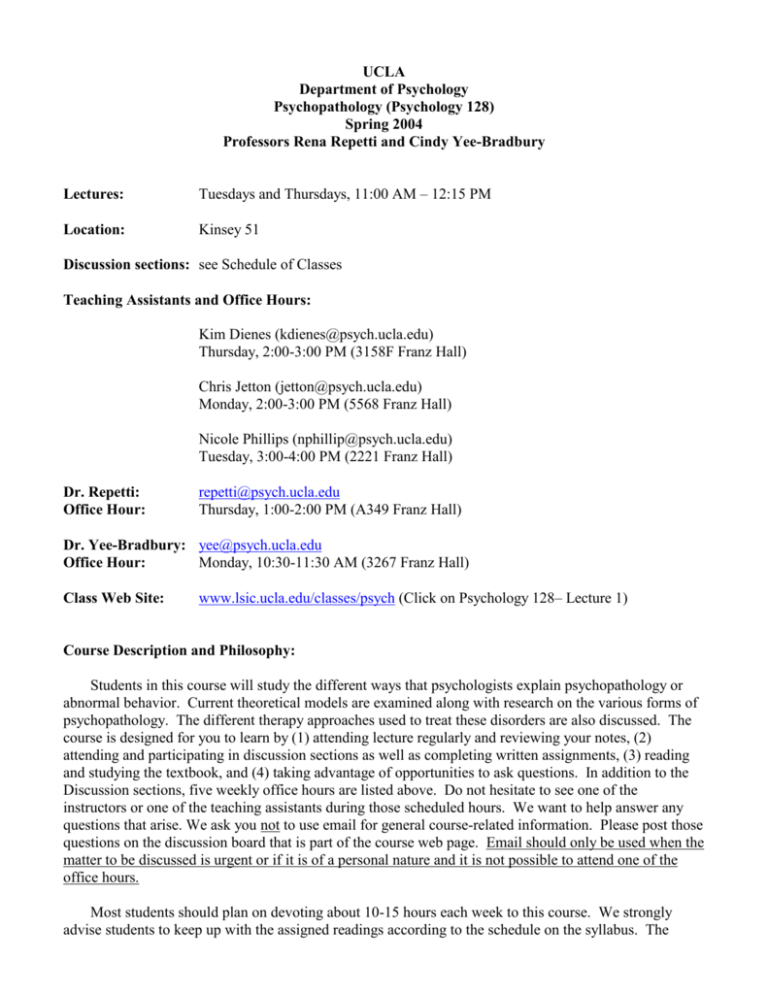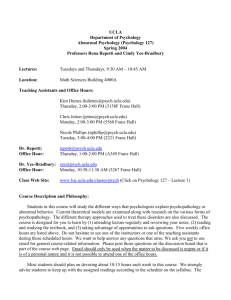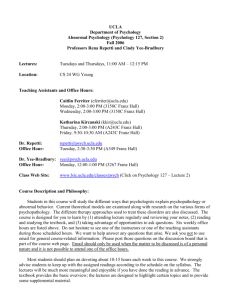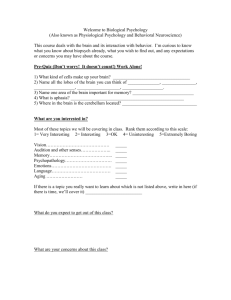syllabus
advertisement

UCLA Department of Psychology Psychopathology (Psychology 128) Spring 2004 Professors Rena Repetti and Cindy Yee-Bradbury Lectures: Tuesdays and Thursdays, 11:00 AM – 12:15 PM Location: Kinsey 51 Discussion sections: see Schedule of Classes Teaching Assistants and Office Hours: Kim Dienes (kdienes@psych.ucla.edu) Thursday, 2:00-3:00 PM (3158F Franz Hall) Chris Jetton (jetton@psych.ucla.edu) Monday, 2:00-3:00 PM (5568 Franz Hall) Nicole Phillips (nphillip@psych.ucla.edu) Tuesday, 3:00-4:00 PM (2221 Franz Hall) Dr. Repetti: Office Hour: repetti@psych.ucla.edu Thursday, 1:00-2:00 PM (A349 Franz Hall) Dr. Yee-Bradbury: yee@psych.ucla.edu Office Hour: Monday, 10:30-11:30 AM (3267 Franz Hall) Class Web Site: www.lsic.ucla.edu/classes/psych (Click on Psychology 128– Lecture 1) Course Description and Philosophy: Students in this course will study the different ways that psychologists explain psychopathology or abnormal behavior. Current theoretical models are examined along with research on the various forms of psychopathology. The different therapy approaches used to treat these disorders are also discussed. The course is designed for you to learn by (1) attending lecture regularly and reviewing your notes, (2) attending and participating in discussion sections as well as completing written assignments, (3) reading and studying the textbook, and (4) taking advantage of opportunities to ask questions. In addition to the Discussion sections, five weekly office hours are listed above. Do not hesitate to see one of the instructors or one of the teaching assistants during those scheduled hours. We want to help answer any questions that arise. We ask you not to use email for general course-related information. Please post those questions on the discussion board that is part of the course web page. Email should only be used when the matter to be discussed is urgent or if it is of a personal nature and it is not possible to attend one of the office hours. Most students should plan on devoting about 10-15 hours each week to this course. We strongly advise students to keep up with the assigned readings according to the schedule on the syllabus. The lectures will be much more meaningful and enjoyable if you have done the reading in advance. The textbook provides the basic overview; the lectures and discussion sections are designed to highlight certain topics and to provide some supplemental material. Readings: Required - All required reading is from Oltmanns, T. F. and Emery, R.E. (2004). Abnormal Psychology (4th Ed.). Upper Saddle River, NJ: Prentice Hall. Optional - You may also wish to purchase the Study Guide for the text (written by Michele Martin). It provides outlines, learning objectives, key terms, and sample test items for each chapter. Discussion Sections: Each of the Discussion sections will be facilitated by one of the Teaching Assistant (TAs), except for the Honors Section which will be facilitated by Professor Repetti. Attendance at all meetings of your section is required. There also will be one brief, written assignment during the quarter. The written assignment will be 1-1 1/2 pages in length and must be typewritten and double-spaced. Details concerning the paper and other activities associated with Discussion sections will be discussed during the first meeting of each section. You must register for a section and attend that section only. Attention: If you are not enrolled in a discussion section by the end of the second week of the quarter, you will be dropped from this course (Psychology 128) by the computer. Furthermore, CORE courses are over-enrolled to compensate for the typical drop rate. For this reason, Permission to Enroll Authorization Numbers (PTEAN's) will not be issued for this course. Students with concerns should go to the Psychology Advising Office, 1531 Franz Hall. Grading: Grades will be based on scores obtained on two out of three multiple-choice examinations and participation in your Discussion (which includes one written assignment). The lowest of the three exam scores will be dropped and final grades will be determined by an accumulated point system. As indicated below, scores on the two exams sum to a maximum of 58 points and the Discussion section provides a maximum of 16 points. The final grading curve will be based on the total number of points accumulated, with a possible maximum of 74 points. There are no “extra credit” projects in this class. Final grades are determined solely by the two highest-scoring exams and by the Discussion section. There are no exceptions to this policy. Approximately half of the exam items will be based on material covered in lectures and about half will be based on material covered in the text. The final exam is cumulative (i.e., it includes material from all 10 weeks of the quarter). Exam #1 Exam #2 Cumulative Final - 29 points (29 test items) – Tuesday, May 4, 2004 29 points (29 test items) – Thursday, June 3, 2004 29 points (29 test items) – Wednesday, June 16, 2004 during a two-hour period (3:00-5:00 PM) [REMINDER: The lowest of the three exam scores will be dropped] 2 Discussion section - 16 points (10 points for attendance at all meetings; plus 1 written assignment, 6 points) Total = 74 possible points based on the two highest exam scores, the written assignment, and the Discussion section Policy Regarding Missed Exams: Do not enroll in this course if you are unable to be present to take the exams on all three dates: May 4, June 3, and June 16. We assume that every student will take all three examinations when administered to the entire class. When an exam is missed, it is the student’s responsibility to notify Professors Repetti or Yee-Bradbury as soon as possible. A grade of 0 will be assigned when an exam is missed. No excuses will be accepted. Incompletes: A grade of Incomplete ("I") will be assigned only when a student's work is of passing quality but is incomplete for a clearly legitimate reason and only if one component needs to be finished (i.e., one exam). The work must be made up during the next quarter or the grade will lapse to an F, or NP as appropriate. Pass-No Pass Grades: Students who choose to take the course P/NP will receive a P (pass) if they earn point totals worth a C or better, but will receive an NP (no pass) if they earn point totals worth a C- or less. According to the Schedule of Classes, the last day for undergraduates to change their grading basis to Pass-No Pass is May 14, 2004. Change of Grades: The College of Letters and Science specifies that, once assigned, a final grade for the course can only be changed in cases of clerical or procedural errors. Re-examination is not permitted. Student Psychological Services: 4223 Math Sciences Building, 825-0768 A3-062 CHS, 825-7985 Peer Helpline (8pm-midnight) 825-HELP It is not uncommon for students enrolled in this course to find that a topic covered in class has some personal relevance, either in their own lives or in the lives of people close to them. You should know that all regularly enrolled students at UCLA are eligible for confidential services at no charge from Student Psychological Services. 3 PSYCHOPATHOLOGY (Psychology 128) Professors Rena Repetti and Cindy Yee-Bradbury Spring 2004 - Course Schedule WEEK 1 2 3 4 5 6 7 8 9 10 DATE TOPIC READING FROM TEXT Apr 6 (T) Introduction Chapter 1 Apr 8 (Th) Classification of Abnormal Behavior Chapter 4 Apr 13 (T) Mood Disorders Chapter 5 Apr 15 (Th) Mood Disorders (continued) Chapters 3 Apr 20 (T) Mood Disorders (continued) Apr 22 (Th) Schizophrenia Apr 27 (T) Schizophrenia (continued) Apr 29 (Th) Schizophrenia (continued) May 4 (T) ****** EXAM #1 ****** May 6 (Th) Autism May 11 (T) Assessment May 13 (Th) Anxiety Disorders May 18 (T) Anxiety Disorders (continued) May 20 (Th) Health Psychology Chapter 8 May 25 (T) Childhood Externalizing Disorders Chapter 16 May 27 (Th) Childhood Internalizing Disorders June 1 (T) Eating Disorders June 3 (Th) ****** EXAM #2 ****** June 8 (T) Treatment and Intervention June 10 (Th) Conclusion; question and answer session for the Final Exam Chapter 13 Chapter 15 Chapter 6 Chapter 10 Finals Week: June 16 (W; 3:00 – 5:00 PM) ****** CUMULATIVE FINAL EXAM ******






